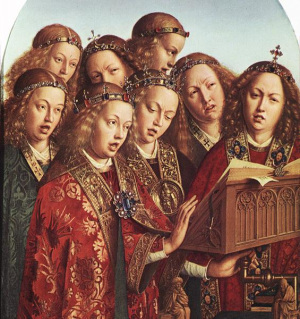The English word praise occurs 248 times in the King James Bible translation. Not surprisingly, it shows up most often in the book of Psalms (155+ times). Psalm 150, which is only six verses long, repeats the word thirteen times! The word worship can be found at least 108 times in the KJV, most notably in the book of Psalms and Revelation, where it is found fifteen times each.
Let us now review a definition of the words worship and praise. The New Illustrated Webster's Dictionary states that worship is, "The act or feeling of adoration or homage; the paying of religious reverence, as in prayer, etc." It can also be "The act or feeling of deference, respect, or honor toward virtue, power, or the like."
Praise, as a verb, means, "To express approval and commendation of; applaud, eulogize and to express adoration of; glorify." As a noun, the word means "Thanksgiving for blessings conferred; laudation to God; worship expressed in song."
By comparing the two definitions, we can first see that praise is part of our worship of Almighty God. We express our approval, thankfulness, and respect for Almighty God by thanking him, especially in song.

This kind of thankfulness then becomes part of our reverence of the Great God. In such an act, we show our love through obeying His commandments, living the way of life He has revealed through His written word, the Bible, communicating with Him in prayer, meeting and fellowshipping with other believers, and in offering thanks to Him.
A Reverent Act
Worship means to prostrate oneself before God, bow down, humbly beseech, and do obeisance or reverence. When we do this, we are demonstrating that compared to God we are as nothing. Praise, on the other hand, means to revere (with extended hands) God by lauding him and what he stands for through prayer, singing and so on.
Examples
Here are a few examples of the Biblical use of the words in question.
All the ends of the world shall remember and turn to the Lord, and all the families of the nations shall worship before You (Psalm 22:27).
My praise shall be of You in the great assembly . . . (Psalms 22:25).
Give unto the Lord the glory due to His name; Worship the Lord in the beauty of holiness. (Psalm 29:2).
Praise ye the Lord. Praise God in his sanctuary: praise him in the firmament of his power (Psalm 150:1).
Now I, John, saw and heard these things. And when I heard and saw, I fell down to worship before the feet of the angel who showed me these things (Revelation 22:8).
Then a voice came from the throne, saying, 'Praise our God, all you His servants and those who fear Him, both small and great!' (Revelation 19:5).
In summary, praise is a form of worship, which involves the whole aspect of our awe, reverence, love, and respect for Almighty God.